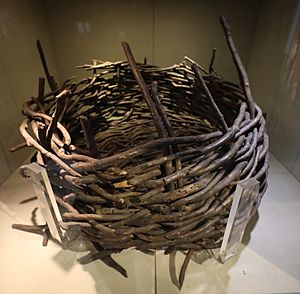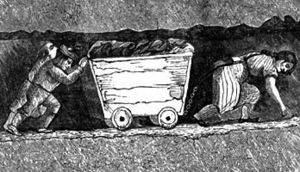Corf (mining) facts for kids
A corf is a special type of basket or small cart used in mining. Miners used corfs to carry coal, ore, and other materials out of the mines.
In the past, corfs were often made from wicker, like a strong basket. Early corfs were moved by people. Miners called "hurriers" would pull them, and "thrusters" would push them. Later, in bigger mines, horses helped pull the corfs.
By the early 1900s, human-powered corfs were mostly gone. By the late 1920s, horse-drawn corfs were replaced too. Instead, mines started using larger minecarts that ran on rails. These carts were pulled by horses or even early motors.
A "tram" was also similar to a corf. It was originally a box on runners, pulled along like a sledge.
Where Does the Word "Corf" Come From?

The word "corf" has been used for a long time, since about 1350 to 1400. It comes from the Middle English word, which was borrowed from Dutch and German words like Korb. All these words ultimately came from the Latin word corbis, meaning "basket."
Corfs You Can Still See Today
If you want to see a real corf, you can visit the National Coal Mining Museum for England. They have a special corf made from hazel wood. It came from a place called William Pit, near Whitehaven. It's a great example of the basket-style corfs used long ago.
See also
- Corf (fishing)
- Decauville wagon
- Minecart
- Mineral wagon
- Mines and Collieries Act 1842
 | John T. Biggers |
 | Thomas Blackshear |
 | Mark Bradford |
 | Beverly Buchanan |


